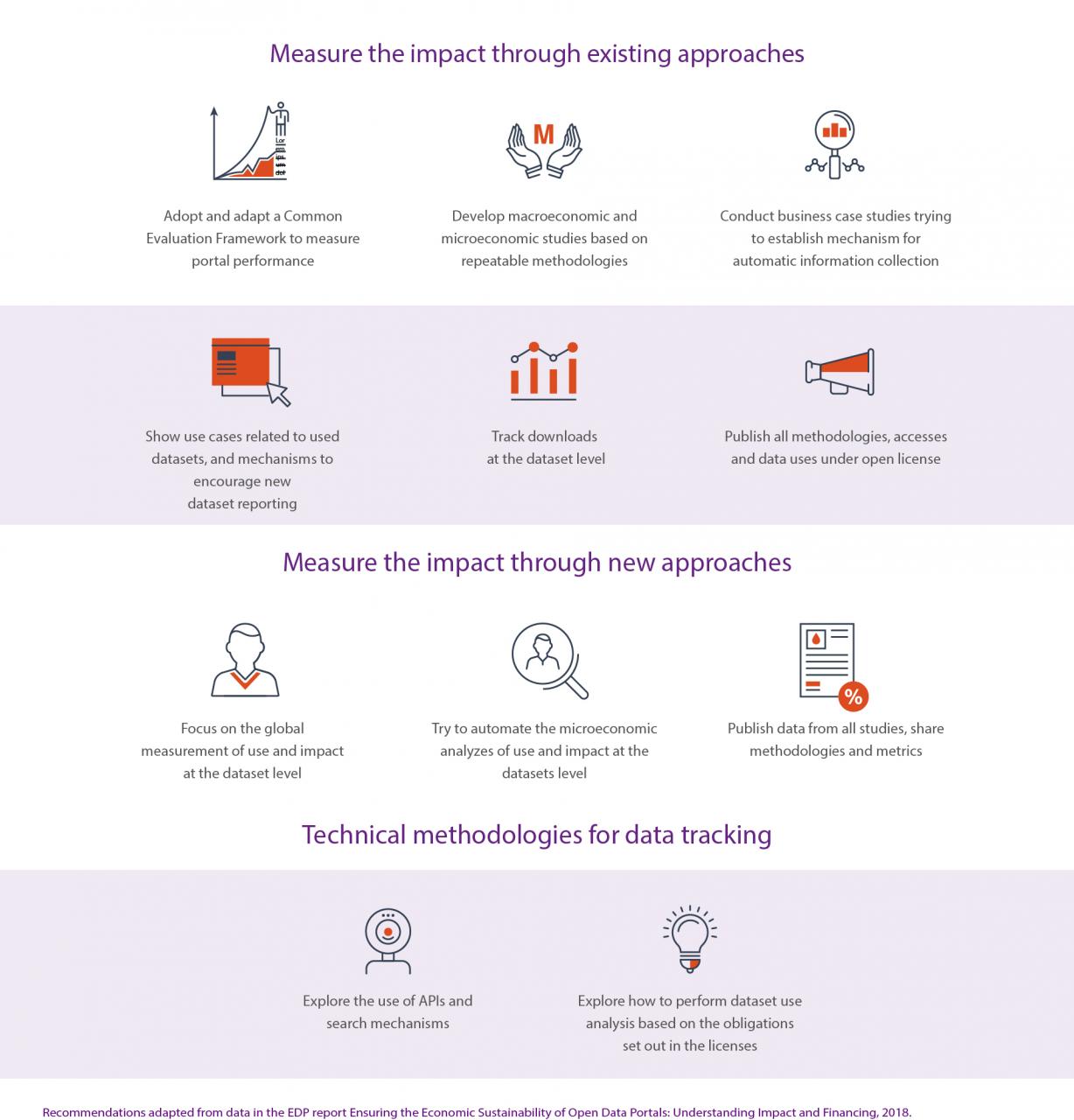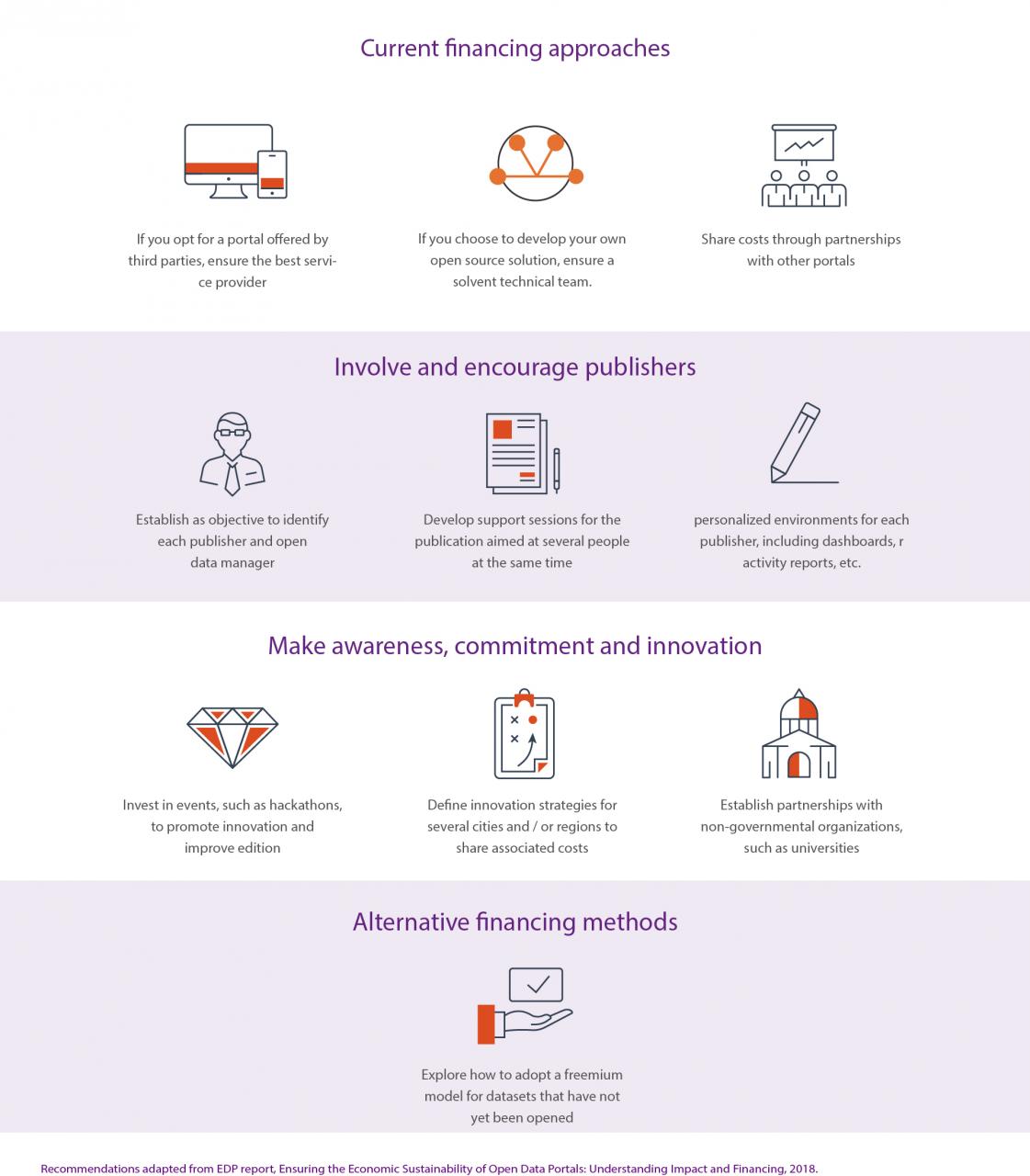
Currently, most of the data opened in Europe are stored in portals and national catalogs that facilitate the search, location and reuse of such information. For this reason, it is essential to ensure the sustainability of these repositories that connect publishers with data users, who are the ones who generate new services that both citizens and businesses can use.
In this context, in February 2017 and within the framework of the European Data Portal (EDP), a report was published to offer a set of recommendations in five key areas -governance, finance, architecture, operations and metrics- in order to guarantee the sustainability of open data portals.
As a complement to this document, a second study has been published with additional recommendations. On this occasion, guidelines are established to improve the monitoring of the impact and reuse of data, and the report reflects on the needs and funding channels in relation with the initiatives launched in different countries in Europe.
Based on a mixed approach, the study revolves around a documentary research, a digital survey and some interviews to gather information on funding, relationships and efforts to measure the access, use and impact of open data.
Based on these data, the report has been structured in two sections: the first section examines the challenge faced by portals in monitoring the use and impact of open data, proposing several methods to improve it. In the second part of the report, a series of recommendations are established on the importance of the sustainability of the portals, whose cost includes not only the maintenance of the infrastructure, but also the actions aimed at making the publishers aware of the relevance of Open data and drive innovation around them.
Part 1: Assessment of the use and impact of open data
To ensure long-term sustainability of Open Data initiatives, all stakeholders involved in open data portals must understand and communicate their progress in order to guarantee financial support for the initiative. For this reason, as indicated EDP Open Data Maturity Report, 46% of the analyzed countries have carried out studies to control the political impact of open data; and 50% have published reports on their economic impact.
However, measuring this impact is not an easy task. The EDP study addresses the different challenges of this analysis, as well as the current efforts and the different approaches used to assess and measure the impact of open data.
On this matter, despite the different approaches used by the portals, the document categorizes five blocks of proposals, as shown in the following scheme:

Part 2: Assessment of the use and impact of open data
As open data stop being an emerging technology and becomes a routine task of the public sector, the budgets allocated to this activity tend to decline, sometimes even losing the necessary financing for its maintenance. In fact, according to the study, in 2017, 71% of EU countries highlighted the lack of financial resources as a barrier for the opening of public information; obstacle that, consequently, blocks the correct measuring of the impact of these initiatives.
For this reason, it is important that open data portals managers know how to use available resources effectively and, as a consequence, sustain their activities in the future.
In this second section of the report, the authors explore ways of financing portals for the sustainability in three key areas:
- Maintain the portal infrastructure
- Involve and motivate data publishers
- Raise awareness, favor the involvement of different actors and the innovation
Based on this analysis, the report concludes with a series of recommendations for each of the identified blocks, as shown in the following image.

Conclusions
One of the main conclusions of European Data Portal report is that the European portals are in an early stage in the analysis of the impact and financial sustainability.
As the report point out, it is necessary that those responsible for open data initiatives understand the portals, not only as repositories of data, but as demonstration of the tangible benefits they bring to citizens.
Likewise, it is pointed out how the portals should evolve taking into account the new ways of serving and demanding data (in real time, via APIs, etc.), and how important proving the value and impact of the data is. In order to ensure financial sustainability, portals must take actions to implement models that ensure the sustainability of long-term initiatives, such as the adoption of freemium models, both for data and for associated services.